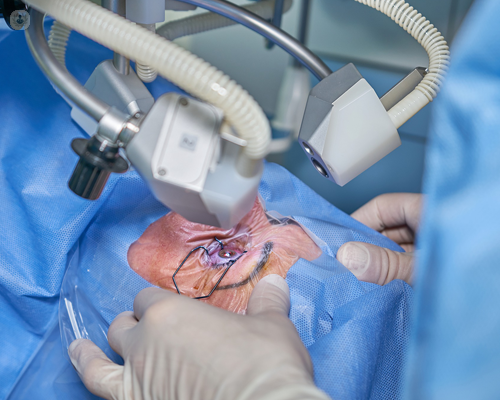Deciding on cataract surgery
Written by:Are you deciding whether to undergo a procedure to remove a cloudy lens - or cataract - from inside your eye? Here to provide expert information in order to assist you in your decision is leading consultant ophthalmologist Mr Mrinal Rana.

What are cataracts?
A cataract is when a lens inside your eye is cloudy. It can make it difficult for you to see well enough to carry out your day-to-day activities. If the cataract isn’t removed, your vision may remain the same, although with time it will usually worsen. Waiting for a longer period of time until you decide to ahead with cataract surgery doesn’t normally make the operation more difficult.
What’s the purpose of cataract surgery?
The purpose of cataract surgery is to replace the cloudy lens (cataract) with an artificial lens implant. One major advantage of private cataract surgery is the ability to select the type of lens implant that will be used: typically, a special multifocal lens typically allows both distance and reading vision without the need for spectacles; toric lenses can treat astigmatism, making vision without glasses even clearer. Your surgeon would normally issue you with a separate leaflet on premium lenses, but this depends on if they’re suitable for you, as it isn’t always possible to use these types of lenses in every patient.
What’s involved in preparation of cataract surgery?
After your eyes have been measured for the cataract procedure, you’re able to schedule it for convenient time. You can also start wearing contact lenses again, if appropriate, until the day prior to your procedure. On the day of your procedure, you’ll be greeted in reception. Then a nurse will start applying eye drops to enlarge the pupil. Anaesthetic eye drops and a disinfectant eye drop will be administered shortly before the cataract procedure itself.
What’s involved in the cataract procedure?
Cataract surgery is usually carried out under using solely local anaesthetic eye drops, although it’s recommended to take a mild sedative tablet in order to allay any anxieties you may have. With local anaesthetic you’ll of course be awake during the procedure. You won’t be able to see what’s happening, but you’ll be aware of a bright light. If you’d prefer more formal sedation or even a general anaesthetic, please notify us in advance as it won’t be possible to arrange this on the day. Calming music, which helps you to stay relaxed, is usually played during the procedure.
During the cataract operation you’ll be asked to keep your head still, and lie as flat as possible. However, we’ll endeavour to ensure you’re comfortable before the procedure begins. The operation is normally quite painless and takes only 10 to 15 minutes, but in rare cases may take up to 45. A nurse will hold your hand the whole time to ensure you’re feeling alright, but also to allow you to communicate with the surgeon as talking unexpectedly is discouraged. The eye to be treated is left exposed only, while the rest of the face is covered up by a drape to keep the procedural area clean.
Most cataracts are removed using the phacoemulsification technique. This is a tiny painless cut of only 2.2mm is made in the eye, the lens is softened with sound waves and then removed via a small tube. The back layer of the lens - also known as the lens capsule or ‘bag’ - which is less than a hundredth of a millimetre thick, is left behind. An artificial lens (implant, IOL) is then inserted into the bag in order to replace the cataract. A small stitch may need to be put in the eye, in rare cases.
What happens after a cataract operation?
If you experience discomfort, a pain reliever such as Paracetamol is recommended. Aspirin shouldn’t be taken however, as this can cause bleeding. It’s normal to have slightly itchy, sticky eyelids and mild discomfort for a while after, although many patients are unaware of any unusual sensations at all. Some fluid discharge is common. Mild discomfort should disappear after one or two days. Although you aren’t encouraged to look, you might notice the white of the eye is red underneath the eyelid. This is normal. In most cases, healing will take about two to six weeks, after which new glasses can be prescribed if required.
You’ll be given eye drops to reduce normal inflammation following cataract surgery. Hospital staff will explain how and when to use them. Please don’t rub your eye, and avoid getting water into the eye in the weeks after surgery (e.g., avoid swimming). Certain symptoms could mean that you require treatment promptly. Please contact your surgeon immediately if you have any of the following symptoms after cataract surgery:
- Pain that’s excessive;
- Vision that’s worsening;
- Increasing redness in the eye.
What is the likelihood of better vision after cataract surgery?
After the cataract operation you may read or watch TV almost immediately, but your vision may be blurred. The eye needs time to adjust so it can focus properly with the other eye, especially if it has a cataract or a differing glasses prescription. Vision dramatically improves when eye drops used to dilate the pupil wear off (around 24 hours), in most cases.
In a recent audit of HerefordVision practice’s all-comers, following cataract surgery, the vast majority of patients have improved eyesight with the average (median) spectacle-free distance vision being ‘20:20’. It was found that 98.4 per cent of patients described themselves as ‘at least happy’ with the procedure.
Please note: if you have another condition such as diabetes, glaucoma or age-related macular degeneration (AMD) your quality of vision may still be limited even after successful cataract surgery, although this is typically explained to you in advance.
If you’re looking for expert cataract surgery or require further ophthalmic assistance, you can arrange an appointment with Mr Rana via his Top Doctors profile.


